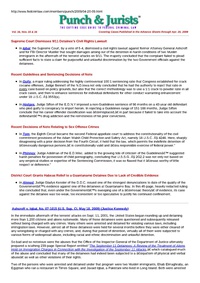In the immediate aftermath of the terrorist attacks on Sept. 11, 2001, the United States began rounding up and detaining more than 1,200 citizens and aliens nationwide. Many of those detainees were questioned and subsequently released without being charged with any crimes. Many others were arrested and detained for …
Sentence for drug crimes is remanded where the government potentially misled defendant as to the minimum penalty he would face after a jury's conviction. The district court should determine whether the government caused misunderstanding of the minimum sentence adversely affected defendant's decision to proceed to trial and resentence if …
When Congress enacted the Anti-Drug Abuse Act of 1986, it established what has come to be known as a 100-to-1 quantity ratio between the two forms of cocaine. Largely in response to the death of two nationally-known sports figures, Congress quickly, and with little debate or study, decreed that …
In this heavily redacted, 45-page decision, Judge Kessler concluded that the Government had failed to prove that it had a valid basis on which to continue to hold Alla Ali Ahmed, a Yemeni citizen, at the Guantanamo Bay Naval Prison. Accordingly, she granted Ali Ahmed’s habeas petition and ordered …
This masterful decision, by one of the ablest sentencing judges in America, adds some significant support to the growing chorus of sharp criticism to the harsh punishment scheme for child pornography possession crimes called for by U.S.S.G. § 2G2.2.
Here, after tracing the history and development of the crime …
Petition for panel rehearing on the issue of whether defendant's motion for a new trial was timely is denied where the motion is still pending before the district court and thus the district court is in the best position to decide whether defendant's pro se motion for a new …
Conviction for firearms possession is affirmed where: 1) district court properly denied defendant's motion to suppress the firearms as officers were responding to an anonymous 911 call reporting an ongoing emergency and had reasonable suspicion to stop and to search defendant; and 2) excusal of a juror pursuant to …
As expected, the battle over the constitutionality of 18 U.S.C. § 4248 is beginning to heat up. That statute, which was enacted into law on July 27, 2006 as part of the Adam Walsh Child Protection and Safety Act, established the “Jimmy Ryce Civil Commitment Program,” which authorizes the …
This is another in a series of recent decisions from the Second Circuit in which a court has refused to go along with the Government’s desire to squeeze out the maximum possible sentence, allowable under a literal reading of the law, no matter how anomalous or absurd the result …
Here the Court held that the civil commitment provisions of the Adam Walsh Act (18 U.S.C. § 4248) (which authorizes, inter alia, the Attorney General and the Director of the Bureau of Prisons to seek the indefinite detention of “sexually dangerous persons” upon completion of their prison sentences for …
In a sentencing decision that is generally noteworthy for its assiduous attention to individualized sentencing based on the unique history and characteristics of the defendant, Judge Sifton imposed a non-Guidelines sentence of 96 months on Bruce Hodges who, as a career offender, faced a Guidelines sentence of 151-188 months …
